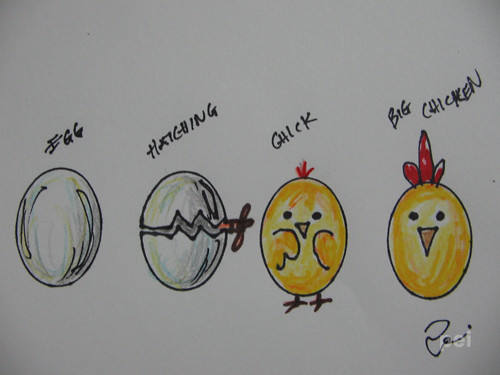Charity runners to settle chicken and egg dispute at London Marathon - All For Eggceptional Cause
One of life’s eternal questions is due to be answered on 13 April when a chicken and an egg compete to determine, once and for all, which came first.
The Flora London Marathon will see charity runner Hannah Miller don a specially designed egg suit and race her colleague Therese Whitcomb-Eriksson, who will be dressed as a chicken, along the 26.2 mile course.
Ms Miller and Ms Whitcomb-Eriksson are running to raise money for the 'Be a Good Egg' campaign being run by the Christian charity World Emergency Relief (WER). They both work for the charity at its central-London office.
for the 'Be a Good Egg' campaign being run by the Christian charity World Emergency Relief (WER). They both work for the charity at its central-London office.
"I’ve always thought the egg came first, and now I’m out to prove it,” says WER’s business and finance manager Miller. “We’re running for fun but I reckon there’s going to be a bit of pushing and shoving when we get close to the finish line. One of us has got to come first if this age-old question is ever going to be resolved.”
WER’s Be a Good Egg campaign is raising money to send laying hens to impoverished families in developing countries, supplying them with a sustainable source of eggs to eat and sell. The chicken and egg runners aim to raise £2,000 by running the marathon which will fund the purchase of more than 330 hens to produce almost 40,000 eggs in a year.
“Forty thousand eggs will be an egg-cellent result,” says Ms Whitcomb-Eriksson, WER’s donor development manager. “Keeping laying hens is one of the easiest steps towards self sufficiency in terms of both food and income. It’s a cheap and easy way to make a real difference to the lives of people who are genuinely hungry and in need.”
The Flora London Marathon will see charity runner Hannah Miller don a specially designed egg suit and race her colleague Therese Whitcomb-Eriksson, who will be dressed as a chicken, along the 26.2 mile course.
Ms Miller and Ms Whitcomb-Eriksson are running to raise money
 for the 'Be a Good Egg' campaign being run by the Christian charity World Emergency Relief (WER). They both work for the charity at its central-London office.
for the 'Be a Good Egg' campaign being run by the Christian charity World Emergency Relief (WER). They both work for the charity at its central-London office."I’ve always thought the egg came first, and now I’m out to prove it,” says WER’s business and finance manager Miller. “We’re running for fun but I reckon there’s going to be a bit of pushing and shoving when we get close to the finish line. One of us has got to come first if this age-old question is ever going to be resolved.”
WER’s Be a Good Egg campaign is raising money to send laying hens to impoverished families in developing countries, supplying them with a sustainable source of eggs to eat and sell. The chicken and egg runners aim to raise £2,000 by running the marathon which will fund the purchase of more than 330 hens to produce almost 40,000 eggs in a year.
“Forty thousand eggs will be an egg-cellent result,” says Ms Whitcomb-Eriksson, WER’s donor development manager. “Keeping laying hens is one of the easiest steps towards self sufficiency in terms of both food and income. It’s a cheap and easy way to make a real difference to the lives of people who are genuinely hungry and in need.”

